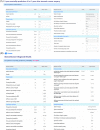Prognostic artificial intelligence model to predict 5 year survival at 1 year after gastric cancer surgery based on nutrition and body morphometry
- PMID: 36775841
- PMCID: PMC10067496
- DOI: 10.1002/jcsm.13176
Prognostic artificial intelligence model to predict 5 year survival at 1 year after gastric cancer surgery based on nutrition and body morphometry
Abstract
Background: Personalized survival prediction is important in gastric cancer patients after gastrectomy based on large datasets with many variables including time-varying factors in nutrition and body morphometry. One year after gastrectomy might be the optimal timing to predict long-term survival because most patients experience significant nutritional change, muscle loss, and postoperative changes in the first year after gastrectomy. We aimed to develop a personalized prognostic artificial intelligence (AI) model to predict 5 year survival at 1 year after gastrectomy.
Methods: From a prospectively built gastric surgery registry from a tertiary hospital, 4025 gastric cancer patients (mean age 56.1 ± 10.9, 36.2% females) treated gastrectomy and survived more than a year were selected. Eighty-nine variables including clinical and derived time-varying variables were used as input variables. We proposed a multi-tree extreme gradient boosting (XGBoost) algorithm, an ensemble AI algorithm based on 100 datasets derived from repeated five-fold cross-validation. Internal validation was performed in split datasets (n = 1121) by comparing our proposed model and six other AI algorithms. External validation was performed in 590 patients from other hospitals (mean age 55.9 ± 11.2, 37.3% females). We performed a sensitivity analysis to analyse the effect of the nutritional and fat/muscle indices using a leave-one-out method.
Results: In the internal validation, our proposed model showed AUROC of 0.8237, which outperformed the other AI algorithms (0.7988-0.8165), 80.00% sensitivity, 72.34% specificity, and 76.17% balanced accuracy. In the external validation, our model showed AUROC of 0.8903, 86.96% sensitivity, 74.60% specificity, and 80.78% balanced accuracy. Sensitivity analysis demonstrated that the nutritional and fat/muscle indices influenced the balanced accuracy by 0.31% and 6.29% in the internal and external validation set, respectively. Our developed AI model was published on a website for personalized survival prediction.
Conclusions: Our proposed AI model provides substantially good performance in predicting 5 year survival at 1 year after gastric cancer surgery. The nutritional and fat/muscle indices contributed to increase the prediction performance of our AI model.
Keywords: Artificial intelligence; Gastric cancer; Prediction; Prognosis; Survival.
© 2023 The Authors. Journal of Cachexia, Sarcopenia and Muscle published by John Wiley & Sons Ltd on behalf of Society on Sarcopenia, Cachexia and Wasting Disorders.
Conflict of interest statement
The authors declare no competing interests.
Figures
References
-
- Stratilatovas E, Baušys A, Baušys R, Sangaila E. Mortality after gastrectomy: a 10 year single institution experience. Acta Chir Belg 2015;115:123–130. - PubMed
-
- Ko Y, Shin H, Shin J, Hur H, Huh J, Park T, et al. Artificial Intelligence Mortality Prediction Model for Gastric Cancer Surgery Based on Body Morphometry, Nutritional, and Surgical Information: Feasibility Study. Applied Sciences 2022;12:3873.
Publication types
MeSH terms
Grants and funding
LinkOut - more resources
Full Text Sources
Medical


